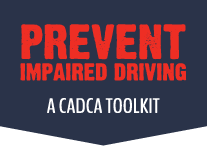Individual-level Strategies
As previously mentioned, this toolkit prioritizes evidence-based environmental-level interventions to reduce impaired driving across the community. The individual-level strategies can also, of course, be applied to prevent risky drinking and impaired driving.
The individual-level strategies in CADCA’s Seven Strategies are:
- Provide Information through public awareness campaigns, community meetings and other traditional and virtual engagement. This strategy focuses on community education in order to increase understanding about the problem(s), root causes, local conditions and solutions that have been identified through community assessment and problem analysis.
- Enhance Skills of community partners and coalition members, as well as those who work where problem drinking takes place. This includes training and technical assistance through various means, such as face-to-face meetings, conference calls or distance learning through webinars, as well as identifying and delivering the tools and resources these partners need to practice skills effectively.
- Provide Support to partners in carrying out actions designed to make necessary changes to the local conditions.
By their nature, individual-level strategies are highly adapted to their target audience to ensure the fidelity of the intervention. Below are some audiences that may be encountered when working in impaired driving prevention, and some interventions to consider:
Audience |
Youth |
People with a history of risky drinking |
Other Stakeholders |
Provide Information |
School-based Instructional Programs
|
Create a campaign of visible enforcement of impaired driving: use appropriate multiple media formats and outlets to gain the attention about fines and other consequences associated with violations. | Create issue briefs that link research about over-service of alcohol to community problems such as violence, property crime, and impaired driving injuries and fatalities
Provide information to licensed establishments about the results of surveys of drivers cited for impaired driving who indicate bars/restaurants as their “place of last drink” |
Enhance Skills |
|
|
Responsible Beverage Sales/Service Training (RBS)
Sponsor training for local law enforcement about conducting low staffing sobriety checkpoints Technical assistance for coalition members and staff to create effective visibility for impaired driving enforcement operations Sponsor drug recognition expert (DRE) training for local law enforcement agencies |
Provide Support |
Screening and Brief Intervention (SBIRT) programs to identify risks for impaired driving
|
|
Provide volunteers to assist local law enforcement agencies with roadside sobriety checkpoints
Monitoring operations to enforce laws against irregular alcohol sales and overserving |

